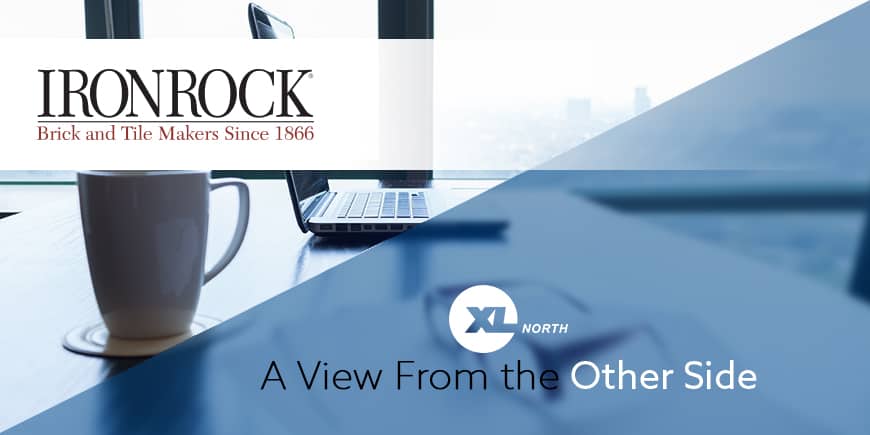 A passion for product and company is apparent in listening to Clare Thomas, National Sales Manager for Metropolitan Ceramics, discuss quarry tile. Metropolitan Ceramics’ parent company, Ironrock, has been in the brick and tile making business since 1866 and is currently led by the fifth generation of the Renkert family. As the leading producer of unglazed quarry tile in North America, Ironrock’s industry expertise, along with family tradition, has earned them a lasting reputation for integrity and craftsmanship.
A passion for product and company is apparent in listening to Clare Thomas, National Sales Manager for Metropolitan Ceramics, discuss quarry tile. Metropolitan Ceramics’ parent company, Ironrock, has been in the brick and tile making business since 1866 and is currently led by the fifth generation of the Renkert family. As the leading producer of unglazed quarry tile in North America, Ironrock’s industry expertise, along with family tradition, has earned them a lasting reputation for integrity and craftsmanship.
Quarry tile, most commonly known for its use in commercial kitchen settings, is an extruded product. It is not pressed. “The extrusion process is like a Play-Doh maker, like a pasta maker,” Clare explains, “and it takes out the possibility of imperfections on the surface of the product, allowing it to be very durable.”
Research from the Tile Counsel of North America shows that quarry tile is at the top of the list when it comes to flooring lifecycle cost per square foot. Product cost, installation and maintenance are all extremely low in comparison to other types of flooring and, as Clare indicates, “It’s maintained simply by cleaning it, and if done properly, it will be down for as long as the building is standing. How much more green can a product get if you never have to replace it?”
On Sustainability:
“How much more green can a product get if you never have to replace it?”
While quarry tile is the most widely accepted product for use in commercial kitchens, the sky is the limit in terms of where it can be installed. Designers and architectural spec writers typically view it as a more utilitarian product, but, as Clare mentions, “It is a product than can be used indoors or outdoors, on floors or on walls.” For example, it can be used as a fireplace surround, a kick wall, a backsplash, as well as on the floor.
As industry trends shape the landscape of flooring, the perception of quarry tile is also changing. Clare jokes, “It’s not your mama’s quarry tile.” He notes, “We have the ability to offer various sizes, textures and colors. The combination of those, we feel, makes it very appealing across markets and industries.” Quarry tile’s versatility has certainly helped it gain market share.
On Today’s Quarry Tile Varieties:
“It’s not your mama’s quarry tile.”
As with most hard surface flooring, proper installation is key. If there are issues with new tile, Clare recommends looking at the install. “What was it grouted with? The tile may not be bad, it may be the grout around it. Or there’s a grout haze left on the product.” He also notes that many installers like to use a tighter grout joint than what’s recommended for quarry tile. “The day in, day out accepted industry standard grout joint line for an eased edge quarry tile is 3/8 inch.” Another common issue that Clare has encountered is the insufficient use of expansion joints in the slab underneath the floor. “If there isn’t an expansion or control joint, there’s nowhere for the slab to ‘give. Where it usually ‘gives’ is along a grout joint and it makes the entire installation look poor. Unfortunately, it’s especially reflective in the tile.”
Quarry tile is unglazed. “The actual texture of quarry tile is like an orange peel and it does have some natural slip resistant characteristics,” Clare points out. Sealing quarry tile is not mandatory, but if one is applied, he notes that a penetrating sealer is recommended, primarily for the grout around the tile. “Penetrating sealers make the overall maintenance of the floor easier in the long run,” he explains.
Polyurethane sealants or other coatings can diminish the product’s integrity, including its durability and slip resistance. “Once you compromise the surface of quarry tile, you’re just making it slippery,” Clare indicates. Often the measure of a clean floor is how shiny it is and, as Clare points out, “That’s not the reason why quarry tile is down. It’s being used for its industrial nature, how long it’s going to last, and its slip resistant ability.”
On the Surface of Quarry Tile:
“Once you compromise the surface of quarry tile, you’re just making it slippery.”
Ironrock Capital, Inc. is a manufacturer of high quality indoor/outdoor unglazed ceramic quarry tile, and architectural thin brick. Located in Canton (Stark County), Ohio, Ironrock uses Ohio clays and shales that are considered to be some of the best in the country. Ironrock operates a facility of 370,000 sq ft, with a workforce of 100 employees.
